Choosing the right enterprise learning management software (LMS) isn’t just a technology decision; it’s a strategic one. Whether you’re onboarding new hires, rolling out compliance training, or upskilling teams, the right LMS can streamline learning, improve employee engagement, and help you stay competitive.
With many options available, how do you choose the right one? Here are some key considerations and the best enterprise LMS options on the market today.
What is an LMS?
A learning management system (LMS) is a digital platform that allows organizations to create, manage, deliver, and track training and educational content. It simplifies the training process by providing a centralized space where administrators can offer the training, monitor progress, and evaluate outcomes. In this space, learners can also access courses and related materials.
LMS platforms are used in a variety of contexts:
Educational institutions teaching students
Businesses training employees, customers, and partners
Organizations and associations offering professional development and certifications
They support multiple content formats, include built-in analytics, connect with tools like HR and CRM platforms, and offer automations to save time.
What is an enterprise LMS?
An enterprise LMS takes the functionality of a traditional LMS and scales it to meet the needs of large, often global, organizations. It’s designed to support complex training environments where the needs of hundreds or even thousands of learners must be met. While often thought of in terms of internal training, such as employee training, enterprise LMS systems can be used by any organization with learners across locations, departments, and roles.
When used for internal training, enterprise LMS systems align employee development with organizational goals, ensure consistency across large teams, and prepare workforces to meet current and future challenges. These platforms often include certification tracking, performance analytics, mobile access, role-based learning paths, and integrations with third-party tools. Some platforms may support multi-audience training, allowing organizations to create separate learning portals for different groups, such as regional teams, audience segments, or contractors.
How does an enterprise LMS differ from a traditional LMS?
Both traditional LMS and enterprise LMS platforms help organizations deliver and track training. Where they differ is in their scale, complexity, and strategic focus.
A traditional LMS is often designed for smaller organizations or less complicated training needs. Like an enterprise LMS, a traditional LMS supports course creation, learner tracking, and certifications, but it’s typically built for one audience and doesn’t require much customization.
Where a traditional LMS is ideal is for small businesses or teams that need standardized training without complexity, an enterprise LMS is focused on large, often global teams that require more sophisticated training environments.
An enterprise LMS supports a wide range of use cases, such as onboarding, compliance, upskilling, leadership development, partner enablement, and customer training. These platforms typically include:
Multi-audience support: Multinational companies often have many learning groups, including internal (employees) and external (customers and partners). An enterprise LMS allows these companies to create distinct portals for each audience, with each portal featuring its own branding, content, and permissions.
Advanced user management: In large companies, different roles may require access to varying information. Enterprise LMS systems can be configured to allow HR managers to assign employees to compliance courses, while department heads can track their teams' progress. Meanwhile, frontline employees might only have access to the training content relevant to their roles.
Integrations with core business tools: Learning initiatives often require integration with key platforms, including HR, CRM, sales, and compliance systems. Enterprise LMS platforms integrate with third-party tools like this.
Robust analytics and performance tracking: Enterprise platforms usually include comprehensive analytics and performance tracking. They may even offer customizable dashboards to enhance the analytics further.
Scalability and localization: Many enterprise LMS platforms support multiple languages and time zones, supporting consistent training globally. Some might also have regional compliance content to address regulations across different regions.
What are the benefits of using an enterprise LMS?
An enterprise LMS offers both operational and strategic benefits for organizations training at scale. Here’s what it can do for you:
Improved training efficiency: Using an enterprise LMS, you can quickly roll out new courses, update existing training materials, and give learners ongoing access to content.
Enhanced employee engagement: With features like personalized learning paths, interactive content, gamification, and mobile accessibility, enterprise LMS platforms deliver more engaging learning experiences. This keeps employees motivated and supports greater information retention.
Stronger compliance/risk mitigation: Enterprise LMS makes it easy to track completion, monitor progress, and prove compliance, reducing organizational risk.
Global learning standardization: For organizations with a distributed or international workforce, an LMS ensures consistent training standards and performance expectations, regardless of geography, time zone, or language.
Talent retention and development: Giving employees access to structured development opportunities builds loyalty by showing staff you support their growth.
Cost savings: An enterprise LMS can significantly reduce training costs by eliminating the need for travel, printed materials, and rented training space. With everything delivered digitally, it’s a more cost-effective and scalable solution.
Improved learning experience: Modern enterprise LMS platforms support flexible learning through mobile apps, microlearning, and multimedia content. Learners can train at their own pace and on their preferred devices, boosting satisfaction and completion rates.
Increased sales: When sales teams and channel partners are better trained and confident in their knowledge, that translates to better conversations with customers, stronger positioning, and more closed deals.
Common use cases for enterprise LMS platforms
Enterprise learning management software goes far beyond basic training delivery; it’s a versatile platform designed to support a wide range of organizational learning goals.
Product training: Sales teams, customer support staff, and channel partners benefit from up-to-date product knowledge, so they can confidently position offerings and handle customer inquiries. Marketing and product development teams can also use LMS tools to understand features, benefits, and competitive differentiators.
Performance enablement: Role-specific learning paths, microlearning modules, and on-demand resources help employees build the skills they need to succeed. From frontline staff to executive leadership, personalized learning boosts productivity and supports career growth.
Training as a business: For organizations that monetize their knowledge, such as certification bodies, consultancies, or software vendors, an LMS can deliver customer training programs at scale. This enables revenue generation while adding value for clients.
Mandatory and compliance training: HR, legal, and compliance teams use the LMS to roll out required training like health and safety, data privacy, and DEI. These programs protect the organization and ensure regulatory requirements are met.
Key features in enterprise learning management software
Choosing the right enterprise LMS means looking beyond basic functionality. Large organizations need systems that can scale, adapt, and integrate into broader business goals. Here are the key features that matter (and why they should be part of your decision-making process):
Scalability
Enterprise needs are constantly evolving and often growing. Whether you’re training 500 employees or 50,000 across different locations, your LMS should grow with you, without requiring exponentially more resources. Look for platforms that can handle increasing user numbers, expanding content libraries, and the ability to support new teams or business units without glitches or performance issues. Scalability ensures your training program won’t outgrow your platform, and you won’t be stuck scrambling as your organization grows.
Customization and branding
A consistent, branded learning experience builds credibility and trust in your organization. Customizable LMS platforms allow you to tailor the look, feel, and structure of your portals to match your company’s branding. For organizations with multiple audiences, the ability to customize training environments for different departments, regions, or partners adds significant value.
Advanced reporting and analytics
You need reporting and analytics to show you what is working and what can be improved. Advanced reporting tools let administrators track learner progress, identify skills gaps, monitor course completion, and evaluate training effectiveness across regions or roles. Look for platforms that offer custom dashboards, so you get the insights you need to make informed decisions about your organization. Also look for real-time insights and exportable data.
AI and automation
AI-driven features streamline the learning process by providing personalized course recommendations, automating administrative tasks (such as enrolling learners in courses and sending reminders), and optimizing content searches. Automation also minimizes manual work, making it easier to efficiently manage large-scale training programs.
Integration capabilities
An enterprise LMS should connect seamlessly with your existing tools. Depending on your organization, key integrations could include HRIS, CRM, productivity tools, and identity management systems. These connections help sync user data, automate workflows, and provide a more cohesive experience.
Compliance management
If your industry faces regulatory requirements, compliance training is non-negotiable. A robust enterprise LMS has tools to assign mandatory courses, track completions, automate recertification reminders, and generate audit-ready reports. This reduces risk and keeps your organization aligned with legal and industry standards.
Mobile learning
Much of today’s workforce is mobile. Whether you have field employees, remote teams, or global learners, mobile accessibility ensures that they can complete training anytime, anywhere. Look for platforms with responsive designs or dedicated apps that offer a smooth user experience across all devices.
Social and collaborative learning
Learning doesn’t happen in a vacuum. Social features like discussion boards, peer feedback, chat, and content sharing encourage collaboration and make training more engaging. These tools facilitate knowledge sharing across departments and contribute to a culture of continuous learning.
Each of these features plays an important role in building a high-impact learning ecosystem that’s flexible, engaging, and aligned with your organization’s goals. The best enterprise LMS for your business depends on how crucial each of these features is to your business goals.
Best enterprise LMS platforms
1. Absorb
.jpeg)
Absorb puts AI to work where it matters most with smart administration, deep branding capabilities, and robust reporting tools. Built to support both internal and external training, Absorb gives you the tools to scale globally, engage learners, and report on it all with ease. It also offers course authoring, social learning and gamification, and personalized upskilling, all backed by 24/7 support.
2. Cornerstone OnDemand
.jpeg)
Cornerstone OnDemand is a comprehensive LMS that allows the creation of multiple branded learning portals for different audiences. It also offers personalized learning plans, eCommerce capabilities, and robust analytics to track learner progress.
3. Litmos
.jpeg)
Known for its ease of use, Litmos provides quick deployment, built-in content authoring, and customizable UI branding. It integrates seamlessly with various systems, enhancing the learning experience.
4. Adobe Learning Manager

An award-winning platform that delivers personalized learning experiences integrated into your brand’s website and apps. Adobe Learning Manager supports both employee and customer training with AI-driven recommendations.
5. Docebo
.jpeg)
Docebo offers a versatile platform with features like gamification, social learning, AI authoring, and advanced analytics. The system supports training for multiple audiences, including customers and partners.
6. LearnUpon
.jpeg)
A multi-tenant LMS enabling organizations to create individual branded learning experiences through learning portals. LearnUpon simplifies content management and delivery across different audiences.
7. D2L Brightspace

Built to focus on the learning moment, Brightspace integrates AI, learning science, and human ingenuity to enhance learner achievement. It supports competency-based training and assessments.
8. TalentLMS
.jpeg)
TalentLMS is a user-friendly platform offering blended learning, gamification, certifications, and rich communication tools. It supports live training sessions with integrated videoconferencing.
9. SAP SuccessFactors Learning
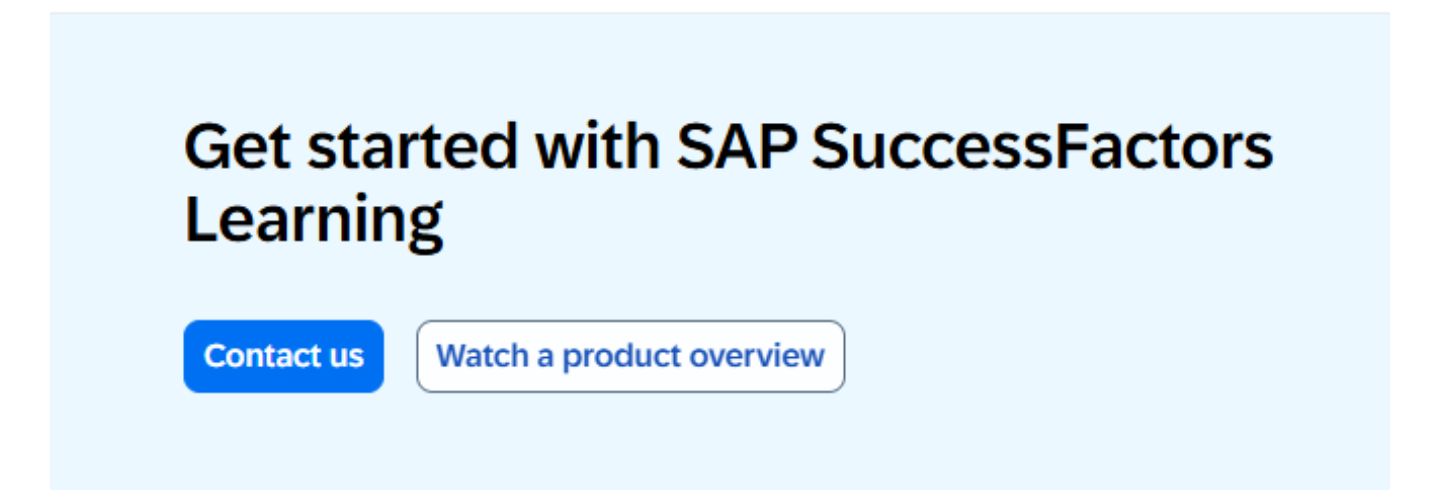
SAP SuccessFactors Learning provides continuous learning experiences and compliance training with AI-driven features. It integrates with SAP's ecosystem, offering curated content from subject-matter experts.
10. SumTotal by Cornerstone
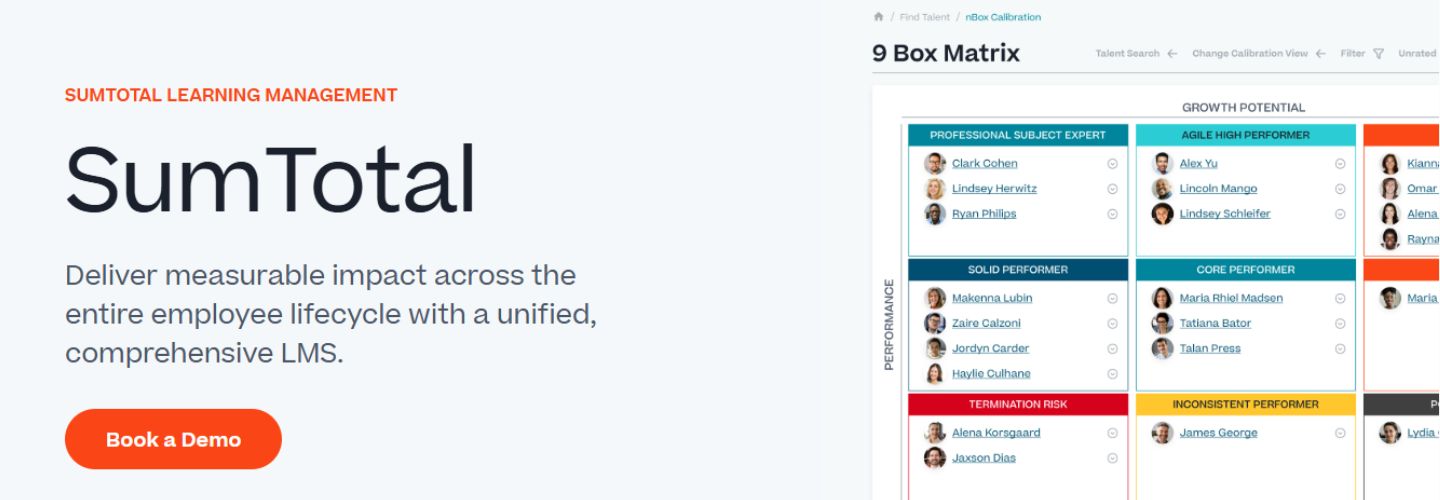
An extended enterprise LMS that simplifies content management with features like activity bundles, a shopping cart, and invoice screens. SumTotal supports compliance and skill development across the workforce.
11. Oracle Learning Cloud
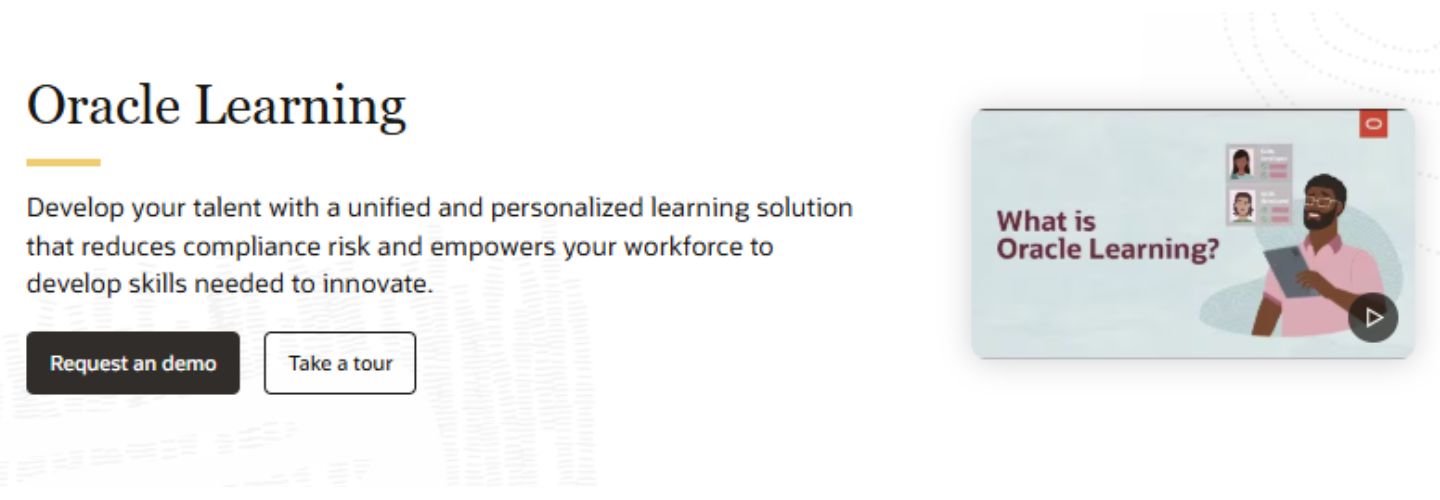
A unified HR learning solution that helps employees develop relevant skills. It offers personalized learning journeys and integrates with Oracle's talent management suite.
12. Moodle Workplace
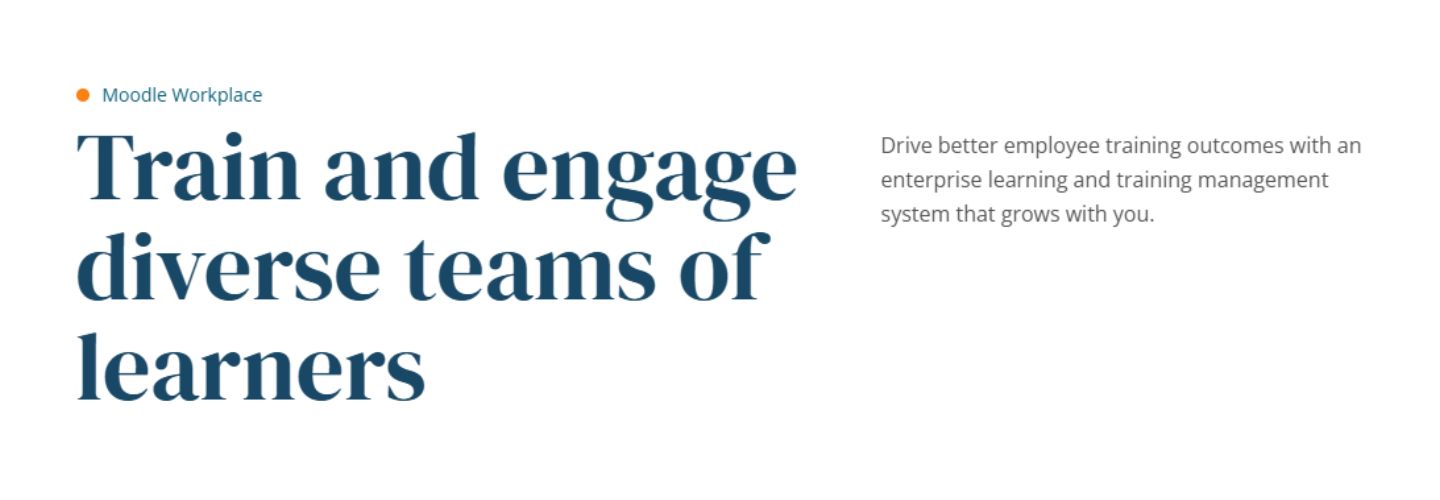
A flexible enterprise LMS combining Moodle's features with advanced tools for workplace learning. It supports onboarding, compliance tracking, and multi-tenancy for different departments.
13. Workday Learning

Workday Learning enables organizations to deliver targeted content based on employee attributes. It supports required training, embeds learning throughout the employee lifecycle, and provides insights into learning effectiveness.
14. Skillsoft Percipio

Skillsoft Percipio offers a personalized learning experience with a mix of videos, books, audiobooks, hands-on practice labs, and live virtual classes. It provides AI-driven recommendations and diagnostic assessments.
15. Kallidus Learn
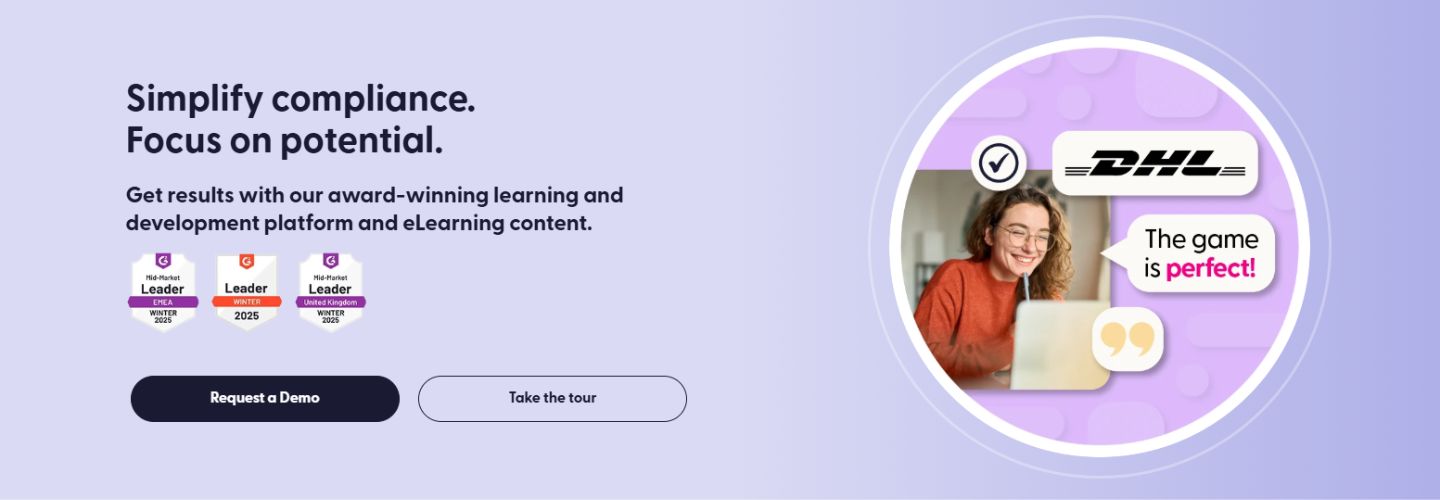
Kallidus Learn simplifies compliance and fosters employee growth with an intuitive platform. It offers features like course authoring, learning paths, certifications, and comprehensive reporting.
16. Valamis
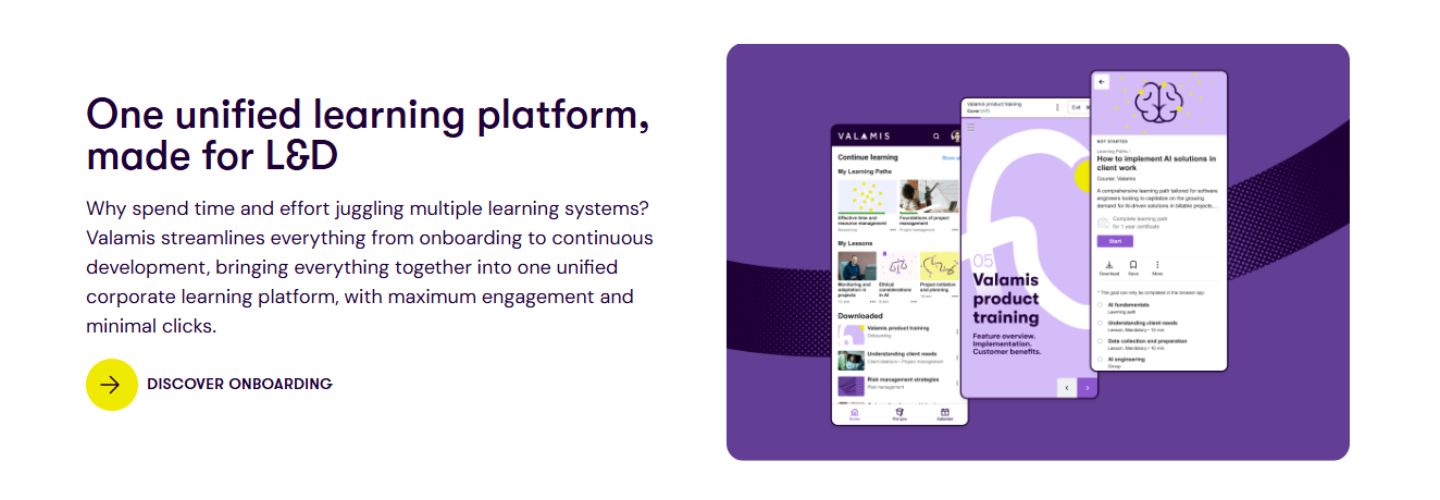
A digital learning platform that combines formal learning, social learning, and learning analytics. Valamis supports personalized learning paths and integrates with various enterprise systems.
17. Fuse Universal
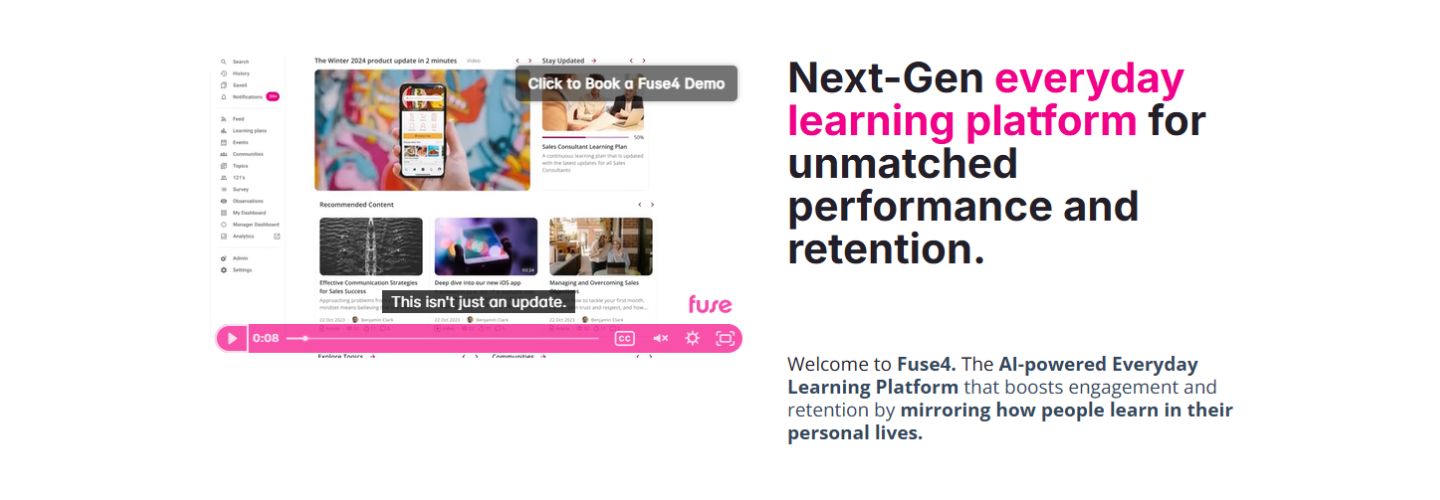
Fuse focuses on social learning by enabling knowledge sharing through video, articles, and discussions. It integrates learning into daily workflows and supports continuous learning cultures.
18. Saba Cloud (Cornerstone)
.jpeg)
Saba provides personalized learning experiences with features like content recommendations, social collaboration, and performance management integration. It delivers both formal and informal learning.
19. Schoox
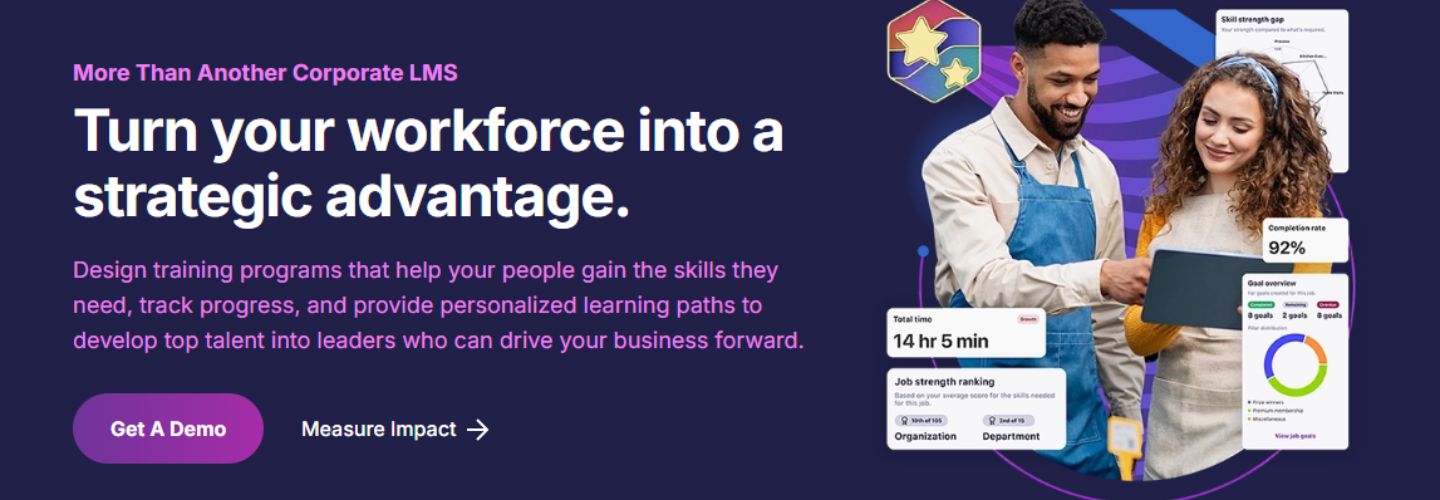
An LMS that offers content creation, course management, and social collaboration tools. Schoox supports employee development with real-time analytics and mobile accessibility.
20. Totara Learn
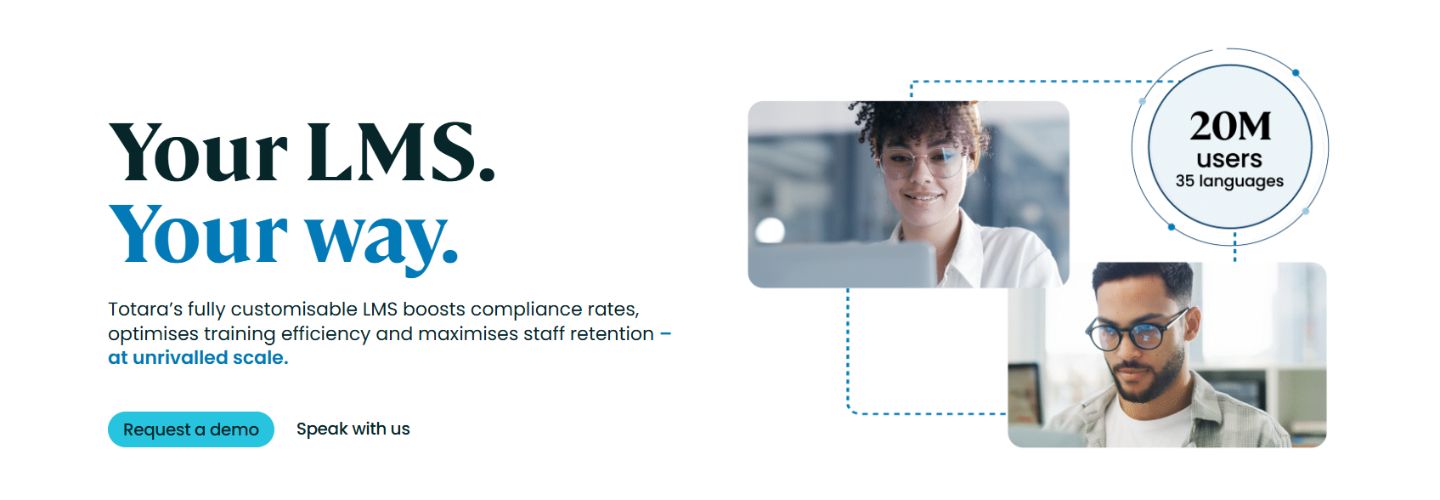
An open-source LMS that provides flexibility and customization. Totara supports compliance training, performance management, and integrates with various HR systems.
Choosing the right enterprise LMS
The best enterprise LMS platforms do more than deliver training. They drive business performance, support compliance, enhance employee engagement, and scale with your organization’s growth. Whether you're focused on upskilling your workforce, enabling partners, or monetizing your training programs, the right LMS can make all the difference.
Ready to see how an LMS can meet your unique needs? Book a personalized demo and discover how the right platform can transform the way your organization learns and grows.






